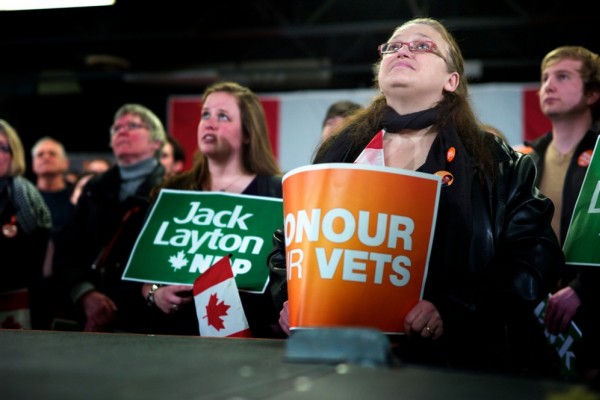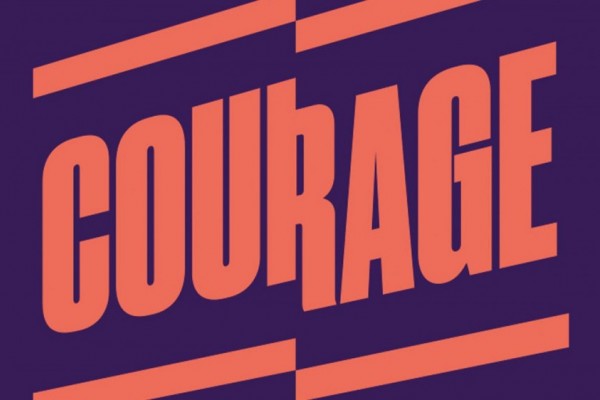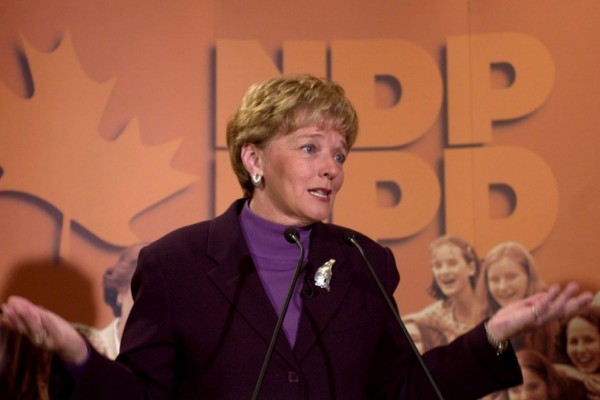One NDPer’s position on the leadership contest
Any of the four hopefuls will make a great leader

NDP MP Niki Ashton. Photo by Alex Tétreault/Flickr.
The NDP leadership race is best described as a marathon. There have been nine debates, countless meet-and-greets, and numerous telephone and digital town halls. All those who put their name forward have dedicated the better part of a year or more to this process.
But we near the end of the contest. In less than a week, all four candidates will meet in Hamilton for a leadership showcase, and on the following day the voting process will begin, with each ballot being done in stages should multiple be required. By as soon as October 1 (but by no later than October 15) we’ll know who will lead the federal NDP into the 2019 election to challenge Justin Trudeau and Andrew Scheer.
And so we are at the stage now where people can confidently sketch out who they support and in what order. The process is a ranked-ballot, where the eventual winner will require at least 50%+1 support. This means that voters can rank anywhere from one to four candidates and, should their first choice be eliminated, still be able to influence the outcome of the contest. There is thus no need for strategic voting like one sees in the first-past-the-post process.
With all this being said—and given that I have covered much of the race for Canadian Dimension—I offer my perspective on the four contestants and how I have decided to rank them. These rankings are purely my own, and don’t represent those of Canadian Dimension. From the top, it must be said that I deem all four candidates as highly worthy of leading the party, and would be happy with each at the helm. Put simply, I will continue to be a supporter of, and activist within, the NDP regardless of the outcome.
Niki Ashton
Niki is at the top of my ballot for a variety of reasons. Not only are her efforts as a millennial leader important in terms of bringing new perspectives to our political discourse, but she’s also trailblazing a path for young women seeking to balance the realities of their career and family life. Most importantly, however, is her determination to embrace social movements, stand for left-wing issues, and adopt a strident socialist image and vocabulary. Likewise, she has connected herself to insurgent left-wing campaigns like those of Bernie Sanders and Jeremy Corbyn. Niki more than her competitors has spoken on touchstone policy matters like public ownership, free postsecondary education, support for Palestine, and the need to fight systems of hatred and oppression.
I don’t think it’s fair to say Niki is the only ‘left’ voice in this race, but I do feel it fair to say that without her participation, the discourse would not have embraced so openly the left-wing roots that have defined the CCF-NDP for nearly a century.
This isn’t to say that Niki has run a flawless campaign. Many have critiqued her use of inaccessible terms like eco-feminism, and while I don’t fully share those concerns, part of Niki’s impact was limited by not offering in highly specific terms the process and parameters by which she planned to democratize the economy.
Few seem to be ranking Niki as a contender to emerge from the race as leader, but I feel her impact has already been made, regardless of the final result.
Jagmeet Singh
At the beginning of the race, Jagmeet wasn’t in such a strong position on my ballot. I wasn’t concerned—as some were—that Jagmeet would hurt the NDP in places like Quebec because I knew he would bring new opportunities in southern Ontario and British Columbia. But I was concerned that he was leaving the Ontario NDP in a difficult position, and that he would have a greater role to play there, either as the party’s next leader, or as a key player within Andrea Horwath’s team. I was also worried that Singh would try to replicate Justin Trudeau’s blueprint, not only in terms of his suave style, but in terms of a milquetoast centrism.
But those fears have largely been allayed. First, Singh has demonstrated to me that he has what it takes to serve the NDP, whether that is as the next federal leader, or as a key part of the ONDP. I am also OK with him not immediately serving in Parliament, given that such an approach worked for Jack Layton as he grew into the formal and informal aspects of leading the party. Perhaps most importantly, Singh has impressed me with nods to strong left policy, from his desire for the full decriminalization of drugs, to his plan to increase taxation to fund new social initiatives. Specifically, his calls to increase the capital gains tax and impose an estate tax are subtlety radical ideas, and should strike a blow for equality of opportunity. And while I am not without concerns about his proposed changes to Old Age Security, I don’t ultimately accept the scare-mongering that comes from other camps on this question.
Finally, Singh has demonstrated great character, poise and compassion, specifically in how he addressed the hateful and aggressive actions of a woman attacking him at a recent campaign function. That was just one moment, but it was a moment that showed me how Singh is ready to lead a party, a movement, and a country.
Guy Caron
Even as a dedicated NDPer, Guy was not well known to me at the start of this leadership campaign, but he was intriguing given his long-time role in the Quebec party, his ability to increase his vote share from 2011 to 2015, and his dedication to centring detailed and frank policy discussions. If Ashton can be said to have brought the field leftward, Guy can be said to have brought a certain rigour.
While Guy has made the point repeatedly that his leadership is the NDP’s only hope of preserving and expanding recent gains in Quebec, that wasn’t the primary reason he has impressed me. Rather, Guy impressed me most when he came to visit my town of Kingston, Ontario. Here, he spoke clearly and openly about his policy positions, mostly around his plan for a Basic Income Guarantee, but also how the party can address labour standards, the failures of the Liberal infrastructure bank, and what the NDP’s role in Quebec is, including at the provincial level.
Most important here was that when Guy spoke on his policy platform, he neither offered vagaries nor spoke as if he was reading off a wooden script written by someone else. Rather, Guy spoke as a true expert on his own policy, and made a substantial impact on every person in the room that night.
My concern with Guy is that his personal style of relating with people is less suited for a national campaign. When on the debate stage, I fail to see what I did in Kingston, which may be a limitation in reaching Canadians in our soundbite-ridden world.
Nevertheless, I would be more than content with Guy as leader, and he must absolutely play a key role in the party’s leadership as one of—if not the principle—voices on policy.
Charlie Angus
More than anyone else on this list, Charlie has that spark which allows him to appeal to ‘regular Canadians,’ and that ability to weave into every one of his lines a powerful story about how he will fight for them in their quest to make the country a better place. Such a skill is equal parts innate and mastered, and Angus is strong on both fronts. None of this is to say that Charlie’s ‘folksiness’ leaves him without policies, because he has addressed issues from Indigenous rights to parental leave to housing to engaging with the idea of a working-class Canada that is both blue and white collar.
But what may turn out to be Charlie’s best policy proposal revolves around making it easier for Canadians to form cooperative enterprises. Cooperatives—in combination with ownership by governments at all levels—are imperative if the NDP is to go beyond liberal democratic reformism to embrace the democratic socialist roots that defined the dream of those early CCFers, many of whom were active cooperators. While Charlie isn’t at the top of my list, this particular policy piece should be picked up by whoever emerges as leader.
My concerns with Charlie don’t make him anywhere near unpalatable as leader in my books, but they are notable. While he’s not the only guilty party in this, I am concerned that he has more than once questioned Jagmeet’s loyalty to the party, and I don’t feel he was fully transparent in his attack upon Jagmeet’s proposal to reform our Old Age Security system. Finally, I am worried about him trying to don the image of the ‘pragmatic’ choice in a field of ‘dreamers.’ This certainly isn’t to say that NDPers can’t challenge one another to sharpen the technical, ideological, and financial realities of policy, but I am concerned that Charlie’s rhetoric may—even if unintentionally—slip the NDP right back into a Mulcair-style leadership, where the party was too afraid to dream of a radically-different Canada, and wholly unprepared to offer voters a roadmap towards that new society. Then again, within Charlie’s many planks can emerge such a ‘dreamer’s platform,’ and I hope to see that happen should he become leader.
As noted above, this list and its rationale is my personal opinion and should be taken as such. Nevertheless, it is my hope that this helps participants shore up their list, even if they disagree with my ultimate interpretation. Any of the four hopefuls will make a great leader, and will have three people willing to help them implement their vision for a just Canada.
Christo Aivalis is a SSHRC Postdoctoral Fellow in the Department of History at Queen’s University. His dissertation examined Pierre Trudeau’s relationship with organized labour and the CCF-NDP, and is being published with UBC Press in early 2018. His work has appeared in the Canadian Historical Review, Labour/le Travail, This Magazine Our Times Magazine, Ricochet, and Canadian Dimension. He has also served as a contributor to the Canadian Press, Toronto Star, CTV and CBC. His current project is a biography of Canadian labour leader A.R. Mosher.










